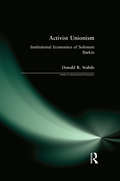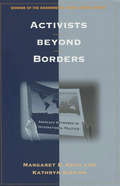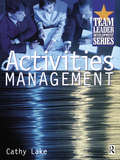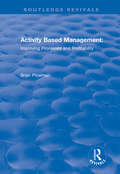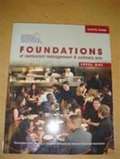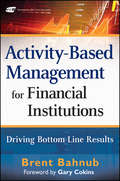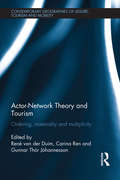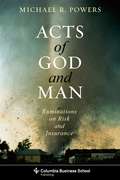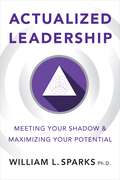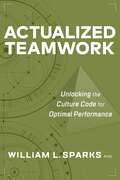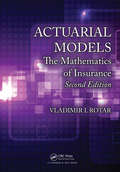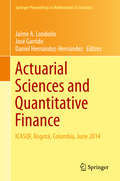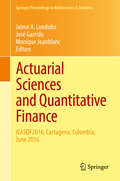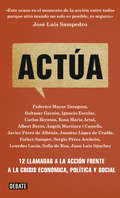- Table View
- List View
Activist Unionism: Institutional Economics of Solomon Barkin
by Donald R. StabileFirst Published in 1994. Routledge is an imprint of Taylor & Francis, an Informa company.
Activists beyond Borders: Advocacy Networks in International Politics
by Margaret E. Keck Kathryn SikkinkIn Activists beyond Borders, Margaret E. Keck and Kathryn Sikkink examine a type of pressure group that has been largely ignored by political analysts: networks of activists that coalesce and operate across national frontiers. Their targets may be international organizations or the policies of particular states. Historical examples of such transborder alliances include anti-slavery and woman suffrage campaigns. In the past two decades, transnational activism has had a significant impact in human rights, especially in Latin America, and advocacy networks have strongly influenced environmental politics as well. The authors also examine the emergence of an international campaign around violence against women.
Activities Management (Team Leader Development Ser.)
by Cathy LakeActivities Management is a comprehensive guide to running a smooth and successful operation. It includes:* practical help on how to plan and manage work;* health and safety in the workplace;* environmental considerations that today's supervisor needs to know. The Team Leader Development Series is an essential tool towards gaining the Supervisory Management Award. Consisting of four practical and interactive textbooks, this series will be invaluable not only to students, but also as a guide individuals and organisations seeking to improve their business performance at the first level of management.Key learning features:* Learning Objectives to enable the reader to assess the knowledge gained throughout the series.* Activities to put the learning into practice.* Case studies - 'true-life' scenarios!* Workbased Assignments which will also provide evidence for S/NVQ portfolios.* Language is straightforward and direct, contextualised to relate to team leaders and supervisory managers working in a wide range of industry sectors.* Influential protagonists in the field will be alluded to as appropriate to support the learning.Tutor resource material for each title in the series is available either as hard copy or is downloadable from the BH website. Please contact BH marketing on bhmarketing@repp.co.uk.
Activity Accounting--Another Way to Measure Costs
by William J. Bruns Jr.Explains the principal differences between traditional cost accounting systems and activity-based costing systems.
Activity Based Management at W.S. Industries (B)
by V. G. Narayanan Jeremy CottDescribes activity-based budgeting at W.S. Industries. Also describes target costing-led product redesign, and product, customer, and order profitability.
Activity Based Management: Improving Processes and Profitability (Routledge Revivals)
by Brian PlowmanThis title was first published in 2001: Product and particularly customer profitability are black holes in most managers’ understanding of their business. Identifying customer revenue is easy but identifying what they cost - so we can understand whether or not they are profitable - is difficult. In a world in which competition, regulation and the increasing use of the Internet put ever greater pressure on margins it is vitally important to understand both product- and customer-profitability. Activity Based Management (ABM) enables you to do this. This book explains the power of using ABM to increase the profitability of your business. It provides step-by-step guidance on basic principles, comparisons between traditional methods, definitions of processes, activities and cost-drivers as well as details of data collection techniques and implementation steps. Through the book’s numerous detailed examples a logical picture builds up of how to obtain the benefits that ABM can deliver. On its own ABM will change management decision-making: by showing how ABM also supports other profit improvement initiatives such as Business Process Reengineering, Shareholder Value Added and Customer Relationship Management, managers will learn how they can use the best possible toolkit to put their business firmly on the road to leaps in profitability.
Activity Guide For Foundations Of Restaurant Management And Culinary Arts: Level 1
by National Restaurant Association Staff<P>Industry-driven curriculum that launches students into their restaurant and foodservice career<P>! Curriculum of the ProStart(r) program offered by the National Restaurant Association.<P> The National Restaurant Association and Pearson have partnered to bring educators the most comprehensive curriculum developed by industry and academic experts.
Activity-Based Costing and Capacity
by Robert S. KaplanDiscusses the use of budgeted rather than historical data in an activity-based costing (ABC) model and argues for calculating rates using practical capacity, not actual utilization. An ABC model need not be limited to analysis of historical data. When cost driver rates are calculated based on forecasted data, they can be used proactively for decisions such as pricing and order acceptance. Second, to avoid distortion of cost driver rates caused by unused capacity, the rates should be calculated using the practical capacity of the resources performing the activity. Discusses how to estimate practical capacity in various situations, including lumpy capacity acquisition, ramp-up of capacity utilization, seasonal and peak-load capacity, and differing service quality levels from supplied capacity.
Activity-Based Costing: Introduction
by Robert S. Kaplan Robin CooperProperly constructed activity-based costing (ABC) systems provide more accurate cost information about business activities and processes, and about the products, services, and customers served by these processes. ABC systems focus on organizational activities as the key element for analyzing cost behavior by linking organizational spending on resources to activities and business processes performed by these resources. This chapter describes the foundations of activity-based costing.
Activity-Based Management at Stream International
by Robert S. Kaplan Norman KleinStream International's Crawfordsville, Indiana facilities undertake the design and implementation of an activity-based costing project. After analyzing the costs assigned to 161 work activities, Crawfordsville managers present five proposals for change based on ABM results, then meet to decide which to implement.
Activity-Based Management for Financial Institutions
by Brent J. BahnubDiscover how to use activity-based management to improve your bottom line The first book of its kind to focus on activity-based management in the financial services industry, Activity-Based Management for Financial Institutions: Driving Bottom Line Results will show you how to drive changes to your organization's bottom line. After providing a brief overview of a financial services activity-based costing model, this book focuses on how to directly improve net income, covering essential topics including costing, chargeback, and pricing; implementing ABC; implementing ABM; managing organizational change; and avoiding pitfalls. Written for those in the financial services industry-banks, securities firms, insurance companies Reveals how to drive benefits to the bottom line through disciplined execution of activity-based management and organizational change management Provides real world examples and tools for quick results and sustained success This one-of-a-kind book will take your financial institution from stuck to financially successful, driving profitability and performance.
Activity-Based Management: Operational Applications
by Robert S. Kaplan Robin CooperThe activity-based costing (ABC) model provides managers with a more accurate economic map of organizational spending and activities. How can managers benefit from this information? Activity-based management (ABM) accomplishes its objective through two complementary applications: operational and strategic ABM. This chapter examines operational activity-based management, which encompasses the actions that increase efficiency, lower costs, and enhance utilization, enabling managers to achieve short-term and highly visible successes from their Stage III ABC system.
Actor-Network Theory and Tourism: Ordering, Materiality and Multiplicity (Contemporary Geographies of Leisure, Tourism and Mobility)
by René van der Duim Carina Ren Gunnar Thór JóhannessonThe recent surfacing of actor-network theory (ANT) in tourism studies correlates to a rising interest in understanding tourism as emergent thorough relational practice connecting cultures, natures and technologies in multifarious ways. Despite the widespread application of ANT across the social sciences, no book has dealt with the practical and theoretical implications of using ANT in Tourism research. This is the first book to critically engage with the use of ANT in tourism studies. By doing so, it challenges approaches that have dominated the literature for the last twenty years and casts new light on issues of materiality, ordering and networks in tourism. The book describes the approach, its possibilities and limitations as an ontology and research methodology, and advances its use and research in the field of tourism.The first three chapters of the book introduce ANT and its key conceptual premises, the book itself and the relation between ANT and tourism studies. Using illustrative cases and examples, the subsequent chapters deal with specific subject areas like materiality, risk, mobilities and ordering and show how ANT contributes to tourism studies. This part presents examples and cases which illustrate the use of the approach in a critical way. Inherently, the study of tourism is a multi-disciplinary field of research and that is reflected in the diverse academic backgrounds of the contributing authors to provide a broad post-disciplinary context of ANT in tourism studies. This unique book, focusing on emerging approaches in tourism research, will be of value to students, researchers and academics in tourism as well as the wider Social Sciences.
Acts of God and Man: Ruminations on Risk and Insurance (Columbia Business School Publishing Ser.)
by Michael PowersMuch has been written about the ups and downs of financial markets, from the lure of prosperity to the despair of crises. Yet a more fundamental and pernicious source of uncertainty exists in today's world: the traditional "insurance" risks of earthquakes, storms, terrorist attacks, and other disasters. Insightfully exploring these "acts of God and man," Michael R. Powers guides readers through the methods available for identifying and measuring such risks, financing their consequences, and forecasting their future behavior within the limits of science.A distinctive characteristic of earthquakes, hurricanes, bombings, and other insurance risks is that they impact the values of stocks, bonds, commodities, and other market-based financial products, while remaining largely unaffected by or "aloof" from the behavior of markets. Quantifying such risks given limited data is difficult yet crucial for achieving the financing objectives of insurance. Powers begins with a discussion of how risk impacts our lives, health, and possessions and proceeds to introduce the statistical techniques necessary for analyzing these uncertainties. He then considers the experience of risk from the perspectives of both policyholders and insurance companies, and compares their respective responses.The risks inherent in the private insurance industry lead naturally to a discussion of the government's role as both market regulator and potential "insurer of last resort." Following a thoughtful and balanced analysis of these issues, Powers concludes with an interdisciplinary investigation into the nature of uncertainty, incorporating ideas from physics, philosophy, and game theory to assess science's limitations in predicting the ramifications of risk.
Actualized Leadership: Meeting Your Shadow and Maximizing Your Potential
by William L. SparksWhat drives the world's most effective leaders? The desire to reach their fullest potential. Actualized Leadership is the first research-based guide to applying Maslow's theory of self-actualization to leadership development. Drawing on the foundational work of Maslow, Jung, McClelland and Frankl, Dr. William Sparks identifies nine traits that define actualized leaders and offers practical strategies to cultivate them. Readers will explore how high-performing leaders think, feel and behave differently and how these patterns contribute to both personal fulfillment and organizational success.Rich in insight and grounded in science, this book is essential reading for leaders ready to deepen their impact by unlocking their inner potential.
Actualized Teamwork: Unlocking the Culture Code for Optimal Performance
by William L. SparksWhy do some teams thrive while others stall? The answer lies in team culture and the emotional dynamics that shape it.In Actualized Teamwork, bestselling author Will Sparks introduces the concept of "team-actualization" and provides a research-backed framework for diagnosing and improving team performance. The book presents a clear, evidence-based methodology to assess culture, strengthen communication, build trust and increase engagement. Readers will discover the 5 Dimensions of Teamwork and learn practical strategies for enhancing each, supported by tools and examples from real teams.Accessible and actionable, this book includes a free team assessment and is an essential guide for leaders seeking to unlock the full potential of their teams.
Actuarial Aspects of Long Term Care (Springer Actuarial)
by Frédéric Planchet Etienne Dupourqué Néfissa SatorThis book proposes a review of Long-Term Care insurance; this issue is addressed both from a global point of view (through a presentation of the risk of dependence associated with the aging of the population) and an actuarial point of view (with the presentation of existing insurance products and actuarial techniques for pricing and reserving). It proposes a cross-view of American and European experiences for this risk. This book is the first dedicated entirely to long-term care insurance and aims to provide a useful reference for all actuaries facing this issue. It is intended for both professionals and academics.
Actuarial Models: The Mathematics of Insurance, Second Edition
by Vladimir I. RotarActuarial Models: The Mathematics of Insurance, Second Edition thoroughly covers the basic models of insurance processes. It also presents the mathematical frameworks and methods used in actuarial modeling. This second edition provides an even smoother, more robust account of the main ideas and models, preparing students to take exams of the Societ
Actuarial Sciences and Quantitative Finance: ICASQF, Bogotá, Colombia, June 2014 (Springer Proceedings in Mathematics & Statistics #135)
by Daniel Hernández-Hernández Jaime A. Londoño José GarridoFeaturing contributions from industry and academia, this volume includes chapters covering a diverse range of theoretical and empirical aspects of actuarial science and quantitative finance, including portfolio management, derivative valuation, risk theory and the economics of insurance. Developed from the First International Congress on Actuarial Science and Quantitative Finance, held at the Universidad Nacional de Colombia in Bogotá in June 2014, this volume highlights different approaches to issues arising from industries in the Andean and Carribean regions. Contributions address topics such as Reverse mortgage schemes and urban dynamics, modeling spot price dynamics in the electricity market, and optimizing calibration and pricing with SABR models.
Actuarial Sciences and Quantitative Finance: ICASQF2016, Cartagena, Colombia, June 2016 (Springer Proceedings in Mathematics & Statistics #214)
by Jaime A. Londoño José Garrido Monique JeanblancDeveloped from the Second International Congress on Actuarial Science and Quantitative Finance, this volume showcases the latest progress in all theoretical and empirical aspects of actuarial science and quantitative finance. Held at the Universidad de Cartagena in Cartegena, Colombia in June 2016, the conference emphasized relations between industry and academia and provided a platform for practitioners to discuss problems arising from the financial and insurance industries in the Andean and Caribbean regions. Based on invited lectures as well as carefully selected papers, these proceedings address topics such as statistical techniques in finance and actuarial science, portfolio management, risk theory, derivative valuation and economics of insurance.
Actúa: 12 llamadas a la acción frente a la crisis económica, política y social
by Rosa M Artal MAYOR ZARAGOZA, FEDERICODoce razones para actuar frente a la crisis económica política y social. Cuanto más hostil es el entorno y negras las previsiones, más importante es tratar de comprender lo que ocurre y contribuir a la búsqueda de soluciones. Esa es la doble misión que se proponen los autores de Actúa. Después de un convulso 2011, examinan una España y un mundo que se radicalizan, con mayor conciencia ciudadana, pero también con retrocesos históricos en los ámbitos esenciales de nuestra vida. A pesar del desánimo causado por una crisis económica sin precedentes, a la que se une la brutal quiebra de la sociedad y el descrédito de la política, ahora es necesario pensar y actuar. En doce capítulos alrededor de temas específicos (la justicia, la democracia, las relaciones internacionales, el empleo, la sanidad, los medios de comunicación o la ciencia, por ejemplo), destacados expertos analizan la situación actual tras cinco años de crisis y uno de indignación, explican las causas y proponen respuestas. Porque creen -creemos-, que no da lo mismo lo que haga cada uno, porque lo que se hace cuenta, porque estamos a tiempo de construir un nuevo mundo más humano, más justo y más libre. Por todo eso, ¡actúa! Reseñas: «Hay que actuar para no enfermar, levantando la mirada y poniéndose en pie para darnos cuenta de que no estamos solos en la voluntad de un cambio global. La salud se sitúa ahora en el epicentro de la lucha entre economía y política, entre las instrucciones del neoliberalismo y los derechos y necesidades de las personas.»Àngels Martínez I Castells «Se están echando por la borda millones de euros invertidos en miles de científicos para que terminen sobradamente preparados en la calle o en el extranjero. Mientras, la idea de una España basada en la economía del conocimiento y la innovación se pisotea cada vez con mayor fuerza.»Esther Samper y Sergio Pérez Acebrón «La sociedad necesita buenos políticos. Mientras llegan, nos las tenemos que arreglar solos. En el clima neoliberal que vivimos, la cultura debe convertirse en herramienta de lucha.»Javier Pérez de Albéniz «Las grandes luchas ambientales del siglo XXI necesitan de la acción colectiva. Queda dicho que la individual es necesaria, pero en ningún caso suficiente. Los grandes conflictos ecológicos hunden sus raíces en un modelo económico depredador de recursos.»Juantxo López de Uralde «Encontrarse en las calles y comprobar que somos muchas y muchos los que nos cuestionamos el sistema, ha generado una conciencia colectiva de que existen posibilidades, recursos e individuos para alterar el aquí y el ahora.»Lourdes Lucía y Sofía De Roa «Juntos, muchos, insistentemente, informados, aventando reflexiones inducidas y usando el cerebro, el corazón y la dignidad, superando la depresión, la abulia y el miedo que nos adormecen y debilitan, con las armas de la razón y de la no violencia, podemos lograr un mundo más justo para todos.»Rosa María Artal
Acumen Fund - Managing Towards Impact 2018
by V. Kasturi Rangan Shawn Cole Alnoor Ebrahim Caitlin Lindsay Reimers BrummeCase
Acumen Fund: Measurement in Impact Investing (A)
by V. Kasturi Rangan Alnoor EbrahimAcumen Fund is a global venture capital firm with a dual purpose: it looks for a return on its investments, and it also seeks entrepreneurial solutions to global poverty. This case examines Acumen's new projects in Kenya. The organization's investment committee and its chief investment officer, Brian Trelstad, must decide whether or not to fund two for-profit ventures. The first provides clean and accessible shower and toilet facilities in urban areas, serving a critical need for low-income populations - its financial sustainability, however, is less clear. The second investment is a network of successful private health clinics that primarily serve middle-income populations but which have the potential to reach low-income markets. On what basis should Acumen decide whether or not to invest? What performance metrics should it use? As the investment committee nears a decision, political and social unrest breaks out in Kenya following a highly contested presidential election. Acumen Fund must now also consider the political risks of investing.
Acumen Fund: Measurement in Impact Investing (A)
by V. Kasturi Rangan Alnoor EbrahimAcumen Fund is a global venture capital firm with a dual purpose: it looks for a return on its investments, and it also seeks entrepreneurial solutions to global poverty. This case examines Acumen's new projects in Kenya. The organization's investment committee and its chief investment officer, Brian Trelstad, must decide whether or not to fund two for-profit ventures. The first provides clean and accessible shower and toilet facilities in urban areas, serving a critical need for low-income populations - its financial sustainability, however, is less clear. The second investment is a network of successful private health clinics that primarily serve middle-income populations but which have the potential to reach low-income markets. On what basis should Acumen decide whether or not to invest? What performance metrics should it use? As the investment committee nears a decision, political and social unrest breaks out in Kenya following a highly contested presidential election. Acumen Fund must now also consider the political risks of investing.
